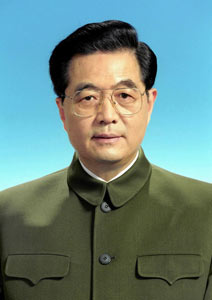Hu takes helm as chairman of army body
14/3/2005 8:41

China's legislature elected President Hu Jintao to the chairmanship of the
state Central Military Commission yesterday, the final step in a leadership
transition that began when he became the general secretary of the Communist
Party of China in November 2002.
Deputies to the National People's Congress
approved Hu's election with loud applause and a near unanimous vote.
An
overwhelming 2,886 delegates cast their ballots for Hu, with six voting against
him and five abstaining.
As results of the vote were announced in the Great
Hall of the People in Beijing, deputies applauded and Hu stood and bowed.
Hu, 62, succeeded Jiang Zemin as China's president in March 2003 and as head
of the Party's Central Military Commission last September. He now holds all the
top positions as head of the Party, military and state.
"I think this really
reflects popular feeling in the country," NPC deputy Li Yuan said as he filed
out of the chamber in the Great Hall of the People after the secret
ballot.
Hu urged the armed forces to perform their "historical mission" and
safeguard China's sovereignty, territorial integrity and national
interests.
"We must continuously enhance our sense of political
responsibility, and always place the task of defending national sovereignty,
security and territorial integrity and safeguarding the interests of national
development above anything else," he said at a plenary meeting of the People's
Liberation Army delegation to the full session of the legislature.
"We shall
step up preparations for possible military struggle and enhance our capabilities
to cope with crises, safeguard peace, prevent wars and win the wars if any," he
said.
"All comrades of the military should correctly understand the situation
and resolutely perform the military's historical mission," Hu told the PLA
deputies.
Jiang's request to resign from his remaining post as chairman of
the state CMC was accepted by the lawmakers last Tuesday. He praised Hu as a
"young and energetic" leader with "rich leadership experience" and "excellent
qualifications."
In a speech last week prior to the opening of the NPC
session, Hu set forth his four-point guidelines for cross-strait relations,
stating that the Chinese people will do their best to seek peaceful
reunification of the nation but will never tolerate "Taiwan independence."
A
draft anti-secession law, which the NPC is expected to ratify today, states that
China would use "non-peaceful means" to stop Taiwan's secession from China
should all efforts for a peaceful reunification prove futile, according to Wang
Zhaoguo, vice-chairman of the NPC Standing Committee.
A white paper, titled
"China's National Defense in 2004" and issued late last year after Hu became
chairman of the Party's Central Military Commission, showed China's
determination on the Taiwan issue.
It is the sacred responsibility of the
Chinese armed forces to stop Taiwan from seceding from the country, said the
white paper.
"... Should the Taiwan authorities go so far as to make a
reckless attempt that constitutes a major incident supporting independence, the
Chinese people and armed forces will resolutely and thoroughly crush it at any
cost," it said.
Lawmakers representing the Chinese military have voiced
consensus to promote defense modernization and provide a solid security
guarantee for the country's development.
"It has great bearing on the
interests of the Party and state to resolutely follow the command of the Party's
Central Committee, the CMC and CMC Chairman Hu Jintao," Zhang Wentai, political
commissar of the PLA's General Logistics Department, told a panel discussion
during the NPC session.
A native of east China's Anhui Province, Hu graduated
from the water conservancy engineering department of Tsinghua University.
Two former provincial Party chiefs and a vice-president of the All-China
Women's Federation were also elected members of the NPC Standing Committee at
yesterday's session.
Xinhua/Reuters
|



